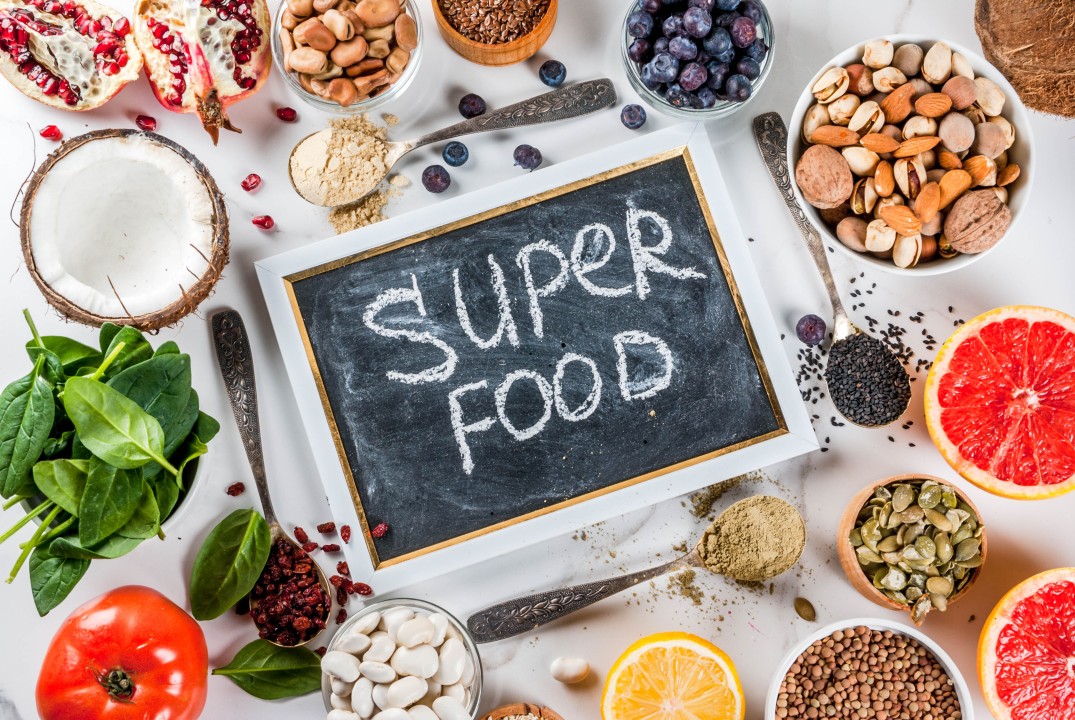Introduction
When it comes to maintaining optimal health, it’s important to fuel our bodies with the right nutrients. One way to do this is by incorporating superfoods into our diet. Superfoods are nutrient-dense foods that provide a wide range of health benefits. In this article, we will explore the concept of superfoods and discuss some examples of these powerful foods.
Superfoods have gained popularity in recent years due to their high nutritional value and potential health benefits. These foods are often packed with vitamins, minerals, antioxidants, and other essential nutrients that can support overall well-being. Incorporating superfoods into our diet can help boost our immune system, improve digestion, increase energy levels, and even reduce the risk of chronic diseases.
One example of a superfood is blueberries. These small berries are rich in antioxidants, which help protect our cells from damage caused by free radicals. Blueberries are also a great source of fiber, vitamin C, and vitamin K. Adding a handful of blueberries to your morning smoothie or oatmeal can provide a delicious and nutritious start to your day.
Another superfood that has gained attention in recent years is kale. This leafy green vegetable is packed with vitamins A, C, and K, as well as minerals like calcium and iron. Kale is also a good source of antioxidants and fiber. Incorporating kale into your diet can be as simple as adding it to salads, stir-fries, or smoothies.
Quinoa is another superfood that is often praised for its nutritional value. This ancient grain is a complete protein, meaning it contains all nine essential amino acids that our bodies need. Quinoa is also a good source of fiber, iron, magnesium, and phosphorus. It can be used as a substitute for rice or pasta and can be enjoyed in salads, soups, or as a side dish.
In addition to these examples, there are many other superfoods that can be incorporated into our diet. Some of these include salmon, chia seeds, spinach, turmeric, and almonds. It’s important to note that while superfoods can provide numerous health benefits, they should be consumed as part of a balanced diet.
In conclusion, superfoods are a great way to boost our nutrient intake and support overall health. By incorporating these powerful foods into our diet, we can provide our bodies with the essential nutrients they need to thrive. Whether it’s adding blueberries to our breakfast or enjoying a kale salad for lunch, small changes can make a big difference in our health and well-being.
Superfoods have gained popularity in recent years due to their numerous health benefits. These nutrient-dense foods are often hailed as a natural way to boost energy, strengthen the immune system, and promote optimal well-being. They are known to provide an array of essential nutrients that are crucial for maintaining good health and preventing chronic diseases.
One of the key features of superfoods is their high concentration of vitamins and minerals. These essential nutrients play a vital role in various bodily functions, including metabolism, immune function, and cell growth. For example, berries such as blueberries and strawberries are rich in vitamin C, which is known for its immune-boosting properties. Leafy greens like spinach and kale are packed with vitamins A, C, and K, as well as minerals like iron and calcium, which are necessary for maintaining healthy bones and teeth.
Antioxidants are another important component found in many superfoods. These compounds help protect the body against oxidative stress, which can lead to chronic inflammation and damage to cells. Superfoods like dark chocolate, green tea, and turmeric are known for their high antioxidant content, which can help reduce the risk of chronic diseases such as heart disease, cancer, and neurodegenerative disorders.
Phytochemicals, also known as phytonutrients, are natural compounds found in plants that have been shown to have numerous health benefits. Many superfoods are rich in phytochemicals, which have been linked to reducing inflammation, improving digestion, and supporting overall well-being. For instance, cruciferous vegetables like broccoli and cauliflower contain sulforaphane, a phytochemical that has been found to have anti-cancer properties.
In addition to their nutrient content, superfoods are often praised for their high fiber and low-calorie content. Fiber is essential for maintaining a healthy digestive system and can help prevent constipation, regulate blood sugar levels, and promote satiety. Foods like chia seeds, quinoa, and legumes are excellent sources of fiber, making them a great addition to a balanced diet.
While superfoods can certainly be beneficial for overall health, it’s important to remember that they should be part of a well-rounded diet. Incorporating a variety of superfoods into your meals can help ensure that you receive a wide range of essential nutrients. However, it’s equally important to consume other nutrient-rich foods like whole grains, lean proteins, and healthy fats to maintain a balanced and diverse diet.
In conclusion, superfoods are a category of foods that are packed with essential nutrients, antioxidants, and phytochemicals. Their high nutrient content, along with their potential health benefits, make them a valuable addition to a healthy diet. By incorporating a variety of superfoods into your meals, you can support your overall health and well-being while enjoying a delicious and nutritious diet.
6. Enhanced Brain Function
In addition to their physical health benefits, superfoods can also have a positive impact on brain function. Certain superfoods, such as blueberries and dark chocolate, contain compounds that have been shown to improve cognitive function and protect against age-related cognitive decline. These compounds, known as flavonoids, have antioxidant and anti-inflammatory properties that can support brain health.
7. Boosted Immune System
Superfoods are often packed with immune-boosting nutrients such as vitamin C, vitamin A, and zinc. These nutrients play a crucial role in supporting the immune system and helping it function optimally. By incorporating superfoods into your diet, you can give your immune system the extra support it needs to fight off infections and stay healthy.
8. Reduced Inflammation
Inflammation is a natural response by the body to protect against injury or infection. However, chronic inflammation can contribute to the development of various diseases, including heart disease, diabetes, and certain types of cancer. Many superfoods, such as turmeric and leafy greens, contain anti-inflammatory compounds that can help reduce inflammation in the body and lower the risk of chronic diseases.
9. Skin Health
Superfoods can also have a positive impact on the health of your skin. Foods rich in antioxidants, such as berries and leafy greens, can help protect the skin against damage from free radicals and promote a youthful appearance. Additionally, superfoods like avocados and fatty fish contain healthy fats that can nourish the skin and improve its overall health and appearance.
10. Increased Energy Levels
By fueling your body with nutrient-dense superfoods, you can experience increased energy levels throughout the day. Superfoods provide the essential vitamins, minerals, and antioxidants needed for optimal energy production and metabolism. They can help combat fatigue and provide a sustainable source of energy to keep you feeling energized and focused.
Incorporating superfoods into your diet can have a wide range of benefits for your overall health and well-being. Whether you’re looking to improve your heart health, boost your immune system, enhance brain function, or simply feel more energized, adding superfoods to your meals can be a delicious and effective way to support your health goals.
Examples of Superfoods
Now that we understand the benefits of superfoods, let’s explore some examples of these nutrient powerhouses:
1. Blueberries
Blueberries are often referred to as a “superfruit” due to their high antioxidant content. These small berries are packed with vitamins C and K, as well as fiber. They have been linked to improved brain health, reduced risk of heart disease, and enhanced immune function.
2. Kale
Kale is a leafy green vegetable that is incredibly nutrient-dense. It is an excellent source of vitamins A, C, and K, as well as minerals like calcium and potassium. Kale is also rich in antioxidants and has been associated with reduced inflammation and improved eye health.
3. Salmon
Salmon is a fatty fish that is loaded with omega-3 fatty acids, which are essential for brain health and heart health. It is also an excellent source of high-quality protein and contains important nutrients like vitamin D and selenium.
4. Quinoa
Quinoa is a gluten-free grain that is a complete protein, meaning it contains all nine essential amino acids. It is also rich in fiber, magnesium, and antioxidants. Quinoa has been linked to improved blood sugar control, reduced inflammation, and enhanced digestive health.
5. Chia Seeds
Chia seeds are tiny black seeds that are packed with nutrients. They are an excellent source of fiber, omega-3 fatty acids, and antioxidants. Chia seeds have been associated with improved heart health, enhanced digestion, and increased energy levels.
These examples are just a small selection of the many superfoods available. Other examples include spinach, almonds, avocados, and sweet potatoes. Incorporating these nutrient-rich foods into your diet can provide a wide range of health benefits. It’s important to note that while superfoods can be a valuable addition to a healthy diet, they should not be relied upon as a sole source of nutrition. It’s always best to eat a varied and balanced diet that includes a wide range of fruits, vegetables, whole grains, lean proteins, and healthy fats.
In addition to their nutritional benefits, superfoods can also be a delicious and versatile addition to your meals. For example, blueberries can be enjoyed in smoothies, added to yogurt or oatmeal, or eaten on their own as a snack. Kale can be used in salads, sautéed as a side dish, or blended into a green smoothie. Salmon can be grilled, baked, or broiled and served with a side of roasted vegetables. Quinoa can be used as a base for grain bowls, added to salads, or used as a substitute for rice or pasta. Chia seeds can be sprinkled on top of yogurt, mixed into smoothies, or used as an egg substitute in baking recipes.
Overall, superfoods are a great way to boost your nutrient intake and support your overall health and well-being. By incorporating a variety of superfoods into your diet, you can provide your body with the essential vitamins, minerals, and antioxidants it needs to thrive.
How to Incorporate Superfoods into Your Diet
Now that you know the benefits of superfoods and have some examples to choose from, here are a few tips on how to incorporate these nutrient powerhouses into your diet:
1. Start Small
If you’re new to superfoods, it’s best to start small and gradually incorporate them into your meals. Begin by adding a handful of blueberries to your morning cereal or swapping out regular rice for quinoa. As you become more comfortable, you can experiment with different superfoods and recipes.
2. Mix and Match
Don’t limit yourself to just one superfood. Mix and match different options to create a variety of flavors and textures. For example, you can combine kale, quinoa, and salmon to create a nourishing salad or blend blueberries and chia seeds into a delicious smoothie.
3. Get Creative
Superfoods can be incorporated into a wide range of dishes, so don’t be afraid to get creative in the kitchen. Try adding kale to your omelets, sprinkling chia seeds on top of your yogurt, or using quinoa as a base for your stir-fries. The possibilities are endless!
4. Plan Ahead
To ensure that you have superfoods readily available, it’s important to plan ahead. Make a shopping list that includes your chosen superfoods and stock up on them during your grocery trips. You can also prepare meals and snacks in advance to make it easier to incorporate these foods into your daily routine.
5. Explore Superfood Recipes
Another great way to incorporate superfoods into your diet is by exploring superfood recipes. There are countless recipes available online and in cookbooks that specifically focus on incorporating superfoods into delicious meals. From superfood smoothie bowls to quinoa salads, you’ll find a wide range of options to suit your taste and dietary preferences.
6. Superfood Substitutions
If you already have favorite recipes that you enjoy, you can easily incorporate superfoods by making simple substitutions. For example, if a recipe calls for regular flour, you can use almond flour or coconut flour instead. You can also swap out regular pasta for zucchini noodles or use cauliflower rice instead of white rice. These substitutions not only add extra nutrients but also enhance the overall flavor and texture of your dishes.
7. Superfood Snacks
In addition to incorporating superfoods into your main meals, don’t forget to include them in your snacks. Superfood snacks can be a great way to boost your energy levels and satisfy your cravings. You can make homemade energy bars with ingredients like nuts, seeds, and dried fruits, or enjoy a handful of mixed berries as a refreshing snack. Keeping a stash of superfood snacks at home or in your office can help you make healthier choices throughout the day.
8. Superfood Smoothies
One of the easiest and most delicious ways to incorporate superfoods into your diet is by making superfood smoothies. You can blend a combination of fruits, vegetables, and superfood powders like spirulina or maca for a nutrient-packed drink. Adding a scoop of protein powder or a tablespoon of nut butter can also make your smoothie more filling and satisfying. Experiment with different flavor combinations and find your favorite superfood smoothie recipe.
By following these tips, you can easily incorporate superfoods into your diet and reap the numerous health benefits they offer. Whether you’re starting small or diving right in, adding these nutrient-dense foods to your meals and snacks will nourish your body and support overall well-being.




